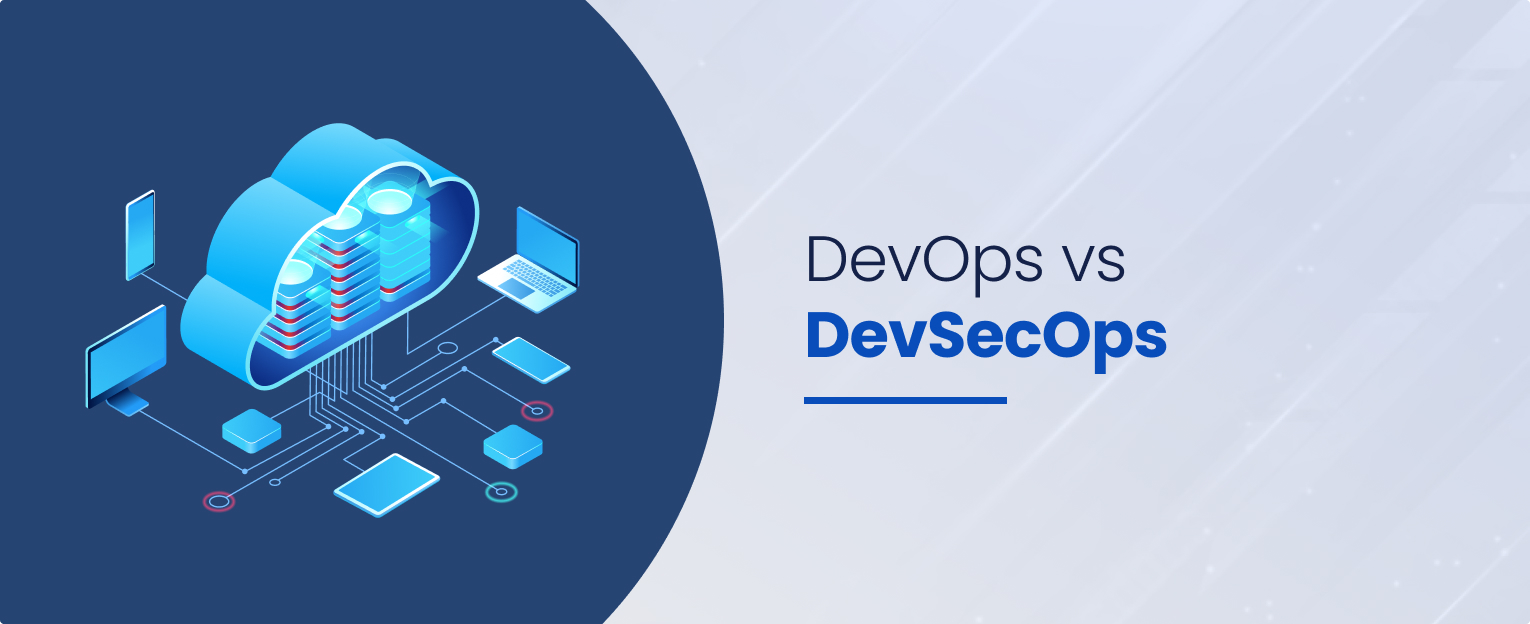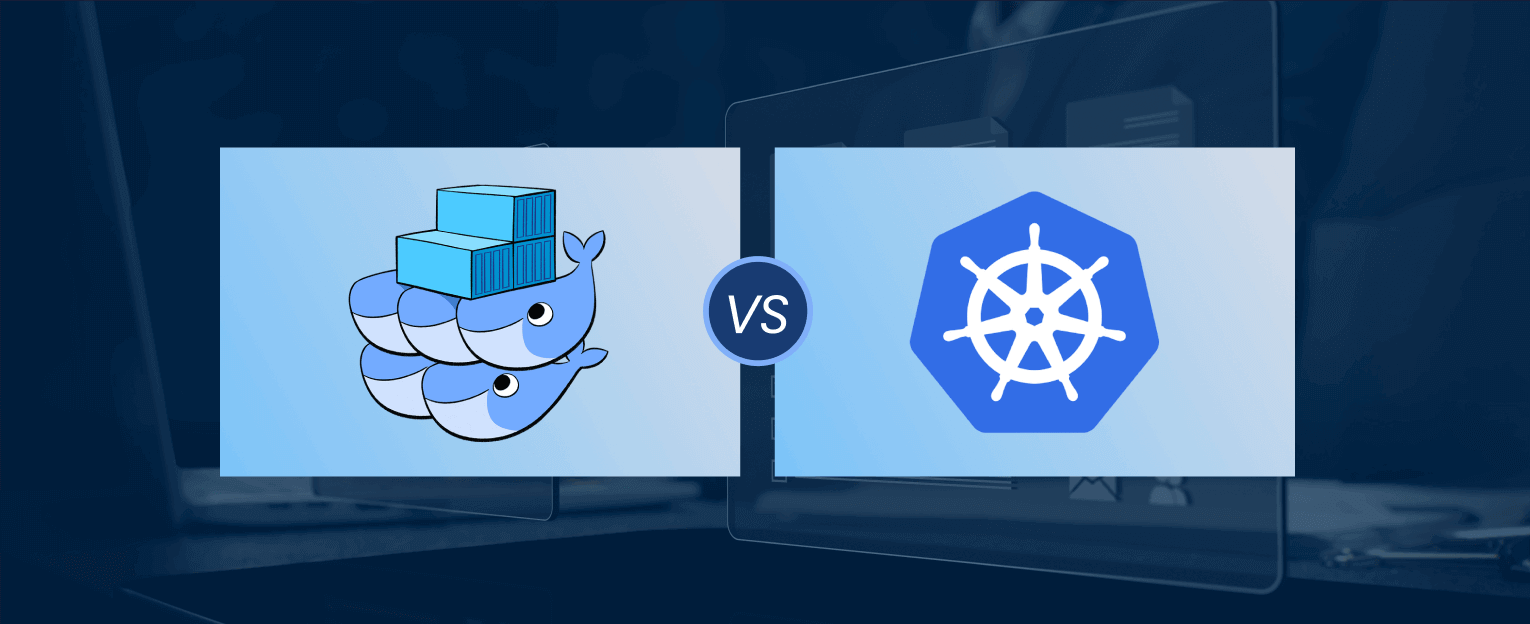Adapting innovation has been important in recent times, particularly for security breaches. Understanding the concept of DevOps vs DevSecOps is part of that transformative journey.
DevOps refers to a process that combines software development (Dev) and IT operations (Ops). The primary aim is to shorten development cycles and consistently provide high-quality software.
Meanwhile, DevSecOps takes this further by integrating security practices into the DevOps process. It insists on ‘security as code.’ This emphasizes the fact that security does not remain an afterthought process. Instead, it gets all the deserving attention during the development cycle.
This article provides a detailed explanation of how these two are different. We have explained the critical differences between DevOps and DevSecOps. Also, we have highlighted their unique roles in software development.
What is DevOps?
DevOps is an organizational approach that fosters collaboration and communication between development (Dev) and IT operations (Ops) teams.
It aims to break down silos, in which the development and operations team traditionally operate in, and establish a sense of shared responsibility throughout the entire software development lifecycle.
It enables organizations to deliver high-quality software faster and with greater efficiency, by emphasizing on automation of repetitive tasks, such as testing and deployment.
Additionally, continuous integration and continuous delivery (CI/CD) are key principles that DevOps teams abide by, which accelerates the product development lifecycle and allows businesses to rapidly deliver the requested features and updates.
What is DevSecOps?
DevSecOps is a relatively newer concept compared to DevOps. It actually expands upon the principles of DevOps by integrating security practices into the software development lifecycle and operations processes from the very beginning.
DevSecOps promotes the idea that security is a shared responsibility among development, operations, and security teams, and it aims to build a culture of security awareness and collaboration.
It emphasizes a “shift-left” approach, where security is incorporated early in the development cycle rather than being an afterthought. By doing so, DevSecOps not only enables organizations to continuously deliver on the feature requests but also prevent the software from any vulnerabilities and security threats.

Your Trusted DevSecOps Services Partner
Are you ready to enhance the security of your software development and operations? Choose Folio3, your trusted partner for DevSecOps services. Boost your organization’s security posture and streamline your development process with our expert guidance.
DevSecOps vs DevOps – A Guide to Compare
In the table below, we will be comparing DevOps vs DevSecOps on different parameters to get a complete perspective of the strengths and limitations of each approach.
| Parameters | DevOps | DevSecOps |
| Definition | DevOps is an organizational approach that focuses on collaboration and automation between development and operations teams. | DevSecOps is an extension of DevOps that integrates security practices into the software development and operations processes from the beginning. |
| Purpose | DevOps aims to improve collaboration, efficiency, and speed of software delivery, enabling faster time-to-market and continuous improvement. | DevSecOps focuses on embedding security into every stage of the software development lifecycle, ensuring secure software delivery and minimizing vulnerabilities. |
| Processes | DevOps emphasizes collaboration, automation, continuous integration and delivery (CI/CD), and streamlining development and operations processes. | DevSecOps extends DevOps practices by integrating security checkpoints, secure coding practices, security testing, and proactive security measures throughout the development and operations workflows. |
| Tools | DevOps commonly used tools such as version control systems, configuration management tools, continuous integration servers, deployment automation tools, and monitoring solutions. | DevSecOps utilizes additional tools for security testing, vulnerability scanning, code analysis, secure configuration management, and security incident and event management (SIEM) systems. |
| Vulnerabilities | While security is considered in DevOps, it may not receive the same level of emphasis as in DevSecOps. | DevSecOps places a strong emphasis on identifying and addressing security vulnerabilities, minimizing risks, and implementing security controls proactively. |
| Teams | DevOps involves collaboration between development and operations teams, promoting shared responsibilities and a culture of continuous improvement. | DevSecOps places a strong emphasis on identifying and addressing security vulnerabilities, minimizing risks, and implementing security controls proactively. |
DevOps vs DevSecOps: Differences
Both of these technologies refer to the concept of development and operations. Yet these differences stating secure DevOps vs. DevSecOps truly distinguish between the two. So do not hesitate; just give it a complete read for a thorough understanding.
Activities Included in DevSecOps
DevSecOps integrates security into the software development lifecycle, promoting a proactive approach to security threats. The critical activities of DevSecOps include static code analysis, threat modeling, and vulnerability scanning. Each of them has a significant role in maintaining robust security.
Threat modeling predicts possible security threats and plans mitigation strategies. It’s a proactive measure that anticipates and addresses potential vulnerabilities before they become exploitable.
Static code analysis is another preventive method. It identifies potential security flaws in the code. An execution program is not required for static code analysis. Hence, it is a non-disruptive but effective security measure.
Then comes vulnerability scanning. It is an ongoing activity in DevSecOps. The continuous scan of applications for known vulnerabilities helps with timely detection and remediation. The scanner updates regularly, thus keeping up to date with the latest threats.
The unique quality of DevSecOps activities is that they aren’t one-off events. Instead, continuous practice takes place in the development lifecycle. They are making it an integral part of the process. This ongoing commitment to security decreases the likelihood of severe breaches, which leads to a safer software environment.
Activities Included in DevOps
A merge of development and operations streamlines software delivery. One of its primary activities is Continuous Integration and Continuous Delivery (CI/CD). CI/CD.
This speeds up application development by connecting all developers. This methodology not only reduces integration problems but also allows teams to deliver software more rapidly.
One more DevOps activity is Infrastructure as Code (IaC). IaC runs the process of setting up and managing infrastructure. This reduces the chances of human error by authorizing teams to use scripts to automate the setup. They make processes repeatable and scalable.
The third activity is about configuration management. This one is also vital when we talk about DevOps. It tracks and controls changes in a software’s development. Hence, it ensures the system’s integrity and functionality over time.
Automation is a foundation in DevOps. From removing manual tasks to speeding up processes to reducing errors. The activity caters to all. After all, the collaboration is paramount.
It brings teams together, maintaining a culture of shared responsibility and transparency. DevOps, therefore, is more than a tool. It is about enhancing team interaction for better software output.
Emphasis on Security Processes in DevSecOps
Security factors have a huge role in showing what is the difference between DevSecOps vs. DevOps. The whole purpose of DevSecOps is to integrate security practices within the DevOps framework, especially by placing a strong emphasis on security processes throughout the Software Development Life Cycle (SDLC).
This approach is distinguished by the continuous incorporation of security measures from the earliest concept and design stages, both through development and deployment.
The primary objective of DevSecOps is to minimize the risks, whether they are associated with application vulnerabilities or misconfigurations. Thereby enhancing the secure delivery of software.
It is essential to know that the concept of ‘shift left’ in DevSecOps focuses on the importance of early detection and fixing weaknesses. Its proactive strategy allows teams to identify and rectify security flaws before they become deeply embedded in the code. Or get more expensive to fix.
To sum up, DevSecOps not only underscores the significance of security in software development but is also known for its proactive management from the outset of the project.
Emphasis on Security Processes in DevOps
Security in DevOps is crucial. Yet, it often remains underrated. Many organizations treat it as a separate stage as the last option. It’s like a gatekeeping phase rather than an integrated component. This approach can be a trouble to progress.
It is time to consider security as an integral element in DevOps. The idea of treating security as a final hurdle can slow down deployment. We should embed security within each phase of the DevOps lifecycle.
In a DevOps world, there is no way to put security into a standalone phase. It should be viewed as a collaborative effort. The teams are supposed to work in tandem, integrating security into their daily tasks.
DevOps should not work as a gatekeeper anymore. It’s time for a shift in perspective. Let’s incorporate security at every step, from the initial design to the final deployment.
This integrated approach promises improved security, quality products, and client satisfaction. We can accelerate our processes by removing the gap between security and DevOps.
Culture and Team Involvement in DevSecOps
Gaining insight into the depth of DevOps vs DevSecOps also requires reading about culture and team involvement. DevSecOps is famous for revolutionizing the traditional development approach.
This is done by instilling a synergistic culture where every member shares responsibility for security. The collaborative environment leads to proactive security measures rather than reactive ones.
The dissolution of silos between development, operations, and security teams is key to this approach. Cross-functional teams play a pivotal role in this case.
Introducing the security expertise within these teams ensures security considerations are addressed at every point. Fusing insights and shared ownership facilitates swift identification and remediation of security risks. Overall, it bolsters the resilience of the software.
In the DevSecOps paradigm, security is a topmost priority. It’s not a mere compliance box to tick. It forms the backbone of the development cycle, integrated into all processes. This shift in perspective underpins a culture where security is embedded in the organization’s DNA.
Furthermore, the focus on DevSecOps is way more than just security concerns. It also extends to the infrastructure and environment where the software is developed and deployed. Especially by promoting inventions in a secure environment.
Culture and Team Involvement in DevOps
DevOps is a culture of promoting collaboration and communication. It assists development and operations teams toward a shared goal. This unity brings prosperity to the team, particularly by fostering speed, reliability, and quality in software delivery.
Although security often takes a backseat in this setup. It’s not unusual to see it categorized into a separate team. The relevant approach leads to risks of creating silos, disrupting the very essence of DevOps.
Integration is key. But it is not that visible when it comes to DevOps. It ensures that every team member becomes a stakeholder in security. The need of the hour is the transformative journey of security from an afterthought to a priority.
After all, it invites a proactive attitude, where teams can identify and address vulnerabilities early in the process.
Yet, this comparison between DevOps vs. DevSecOps doesn’t overshadow the role of security experts. Their skills are invaluable in shaping security strategies and training teams about security.
Therefore, while DevOps encourages a collective effort in security, it requires a diligent, security-focused approach to succeed.
Timing of Security Integration in DevSecOps
The main focus of DevSecOps is the early and continuous security integration throughout the software development life cycle (SDLC). The practice guarantees the timely identification and resolution of vulnerabilities. Eventually, the robustness of the end product will be enhanced.
Continuous integration servers like Jenkins can perform security analysis when it’s time for integration. Furthermore, they can also organize the deployment of security updates. The aim is to ensure that applications are always protected against the latest threats.
Coming to the testing phase, what sets DevSecOps apart from traditional models is their dynamic analysis tools. For instance, OWASP ZAP. They can identify runtime security issues.
Rather than treating security as the last option, DevSecOps accommodates it into every software development life cycle (SDLC) stage. Be it about collecting required information or its deployment and beyond. Security is an added development process.
This holistic approach means the creation of more secure and reliable software. Above all, security is not merely a destination but an ongoing journey that commences right from the first step in DevSecOps.
This relentless commitment to security empowers organizations to stay ahead of emerging threats. And also protect their software assets in an ever-evolving digital landscape.
Timing of Security Integration in DevOps
Incorporating security late in the DevOps process can be a part of a final verification step before deployment. Sometimes, this approach is seen as advantageous.
Teams in this situation initially focus on development aspects while tackling security concerns later. However, this method poses serious drawbacks at times.
Firstly, the late identification of security issues and processes can lead to expensive fixes. The late detection of the errors can increase the cost of remediation. Moreover, it often requires revisiting and altering doubtful sections of the code.
Secondly, the allocation of security factors later security can pose reputational risks since vulnerabilities can often lead to breaches. Such incidents not only harm the company’s reputation. However, it may also affect client trust and have potential legal repercussions.
Hence, it becomes evident that late security integration in DevOps may result in costly and detrimental outcomes.
Automation in DevSecOps
Powering efficiency and speed in security operations, this methodology adopts a proactive approach in DevSecOps. The identification of potential threats before they become serious issues is what automation holds the best. One prominent example is automated vulnerability scanning.
Its specialty is to inspect systems for weak points, eventually, alerting the teams to potential breaches. On top of that, the continuous operation offers up-to-date system health reports.
Another depiction of automation in action is security testing. This process justifies security measures against the possibility of attacks. DevSecOps provides a practical assessment of system robustness.
Their automated security testing streamlines this process to conduct tests at high speed and provide rapid feedback. This enables them to address vulnerabilities promptly.
Automation in DevOps
Automated tools perform repetitive tasks, freeing developers to concentrate more on innovative solutions. When it comes to DevOps, automated security checks can be incorporated into the DevOps pipeline. Moreover, they can also run parallel to other processes without hindering the workflow.
This fact makes security a shared responsibility instead of an afterthought of the software development and deployment process. The capabilities of proactive detection and mitigation of security vulnerabilities enhance the system’s strength.
Automated tools are significant in the DevOps methodology to faster software releases. Automation is a crucial component of both DevOps and DevSecOps. It aids in several points.
They accelerate the process, tighten up the security, and much more. As we move towards a more digitized world, the role of automation in these practices will only become more valuable.

Your Trusted DevSecOps Services Partner
Are you ready to enhance the security of your software development and operations? Choose Folio3, your trusted partner for DevSecOps services. Boost your organization’s security posture and streamline your development process with our expert guidance.
DevOps vs DevSecOps – Navigating the Choice
In conclusion, DevOps vs DevSecOps has many more differences to offer significantly. DevSecOps integrates security from the beginning as an integral part of the entire software development lifecycle. Conversely, DevOps focuses more on development and operations by treating security as an addition.
Even though both are crucial for any business, the significant benefits of DevSecOps in software development cannot be understated. If you are searching for an all-in-one solution, explore the world of DevSecOps and give your software development process the deserved upgrade.
Hope this rugged DevSecOps vs DevOps analysis will help!
- Frequently Asked Questions
Q1. Does DevSecOps include DevOps?
Yes, DevSecOps includes DevOps. DevSecOps extends the principles of DevOps by integrating security practices into the entire software development lifecycle. In DevSecOps security is incorporated early in the development process. DevSecOps builds upon the collaborative and automation-focused culture of DevOps, with an additional focus on ensuring secure software delivery.
Q2. How do I get from DevOps to DevSecOps?
To transition from DevOps to DevSecOps, organizations need to integrate security practices into their existing DevOps processes. This involves incorporating security checkpoints, conducting security assessments, and implementing secure coding practices. Collaboration between development, operations, and security teams is crucial to ensure security considerations are addressed throughout the software development lifecycle.
Q3. Is DevSecOps part of cybersecurity?
Yes, DevSecOps is part of cybersecurity. While cybersecurity encompasses a broader scope of practices and technologies, DevSecOps specifically focuses on integrating security practices into the software development and operations processes. It aims to embed security into every stage of the software lifecycle to ensure that security measures are prioritized and vulnerabilities are minimized.
Q4. What are different stages of DevSecOps?
The stages and tools of DevSecOps may vary depending on the organization and specific implementation. However, common stages include planning, coding, building, testing, deployment, and monitoring.
Q5. What are different tools used for DevSecOps?
Tools used in DevSecOps include security scanning tools, vulnerability assessment tools, code analysis tools, security incident and event management (SIEM) systems, and secure configuration management tools.
Q6. What problems does DevSecOps solve?
DevSecOps addresses several problems related to software security. It helps identify security vulnerabilities early in the development process, enabling prompt remediation and reducing the risk of breaches. DevSecOps promotes collaboration between teams, ensuring that security considerations are integrated into all stages of the software lifecycle.
Q7. How many components are there in DevSecOps strategy?
The components of a DevSecOps strategy can vary, but generally, it includes collaboration between development, operations, and security teams; integrating security practices into the development process; automation of security controls; continuous monitoring and incident response; and fostering a security-aware culture within the organization. The exact number of components may vary based on the organization’s specific needs and goals.














